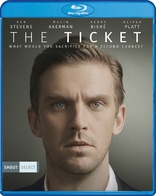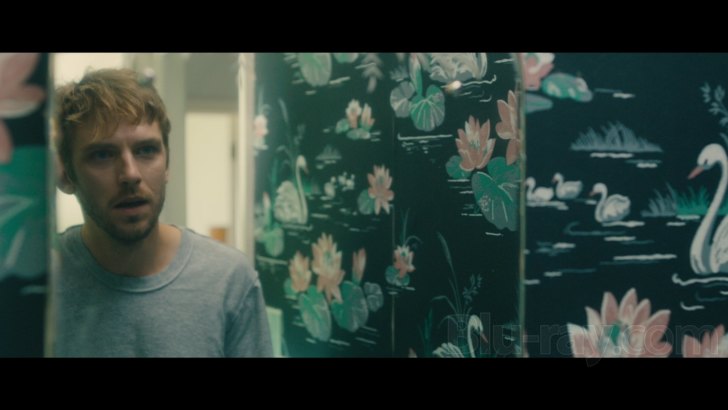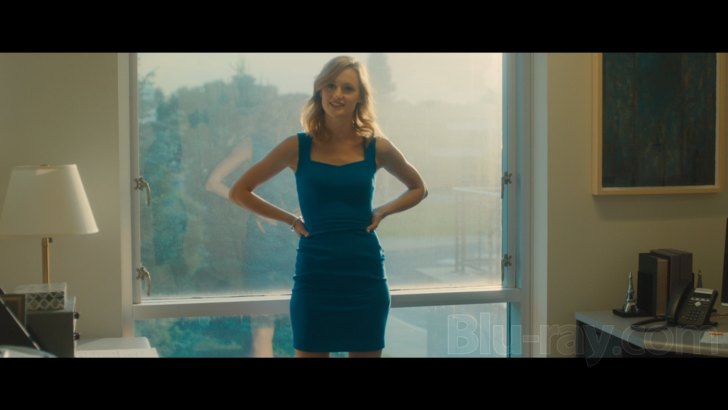The Ticket Blu-ray Movie
HomeThe Ticket Blu-ray Movie 
Shout Factory | 2016 | 99 min | Not rated | Jun 06, 2017
Movie rating
6.1 | / 10 |
Blu-ray rating
| Users | 0.0 | |
| Reviewer | 3.0 | |
| Overall | 3.0 |
Overview
The Ticket (2016)
A blind man who regains his vision finds himself becoming metaphorically blinded by his obsession for the superficial.
Starring: Dan Stevens, Malin Akerman, Kerry Bishé, Oliver Platt, Ekaterina SamsonovDirector: Ido Fluk
| Drama | 100% |
Specifications
Video
Video codec: MPEG-4 AVC
Video resolution: 1080p
Aspect ratio: 2.35:1
Original aspect ratio: 2.35:1
Audio
English: DTS-HD Master Audio 5.1
English: DTS-HD Master Audio 2.0 (48kHz, 24-bit)
5.1: 2995 kbps; 2.0: 1722 kbps
Subtitles
English SDH
Discs
Blu-ray Disc
Single disc (1 BD)
Packaging
Slipcover in original pressing
Playback
Region A (C untested)
Review
Rating summary
| Movie | 3.5 | |
| Video | 3.0 | |
| Audio | 3.5 | |
| Extras | 2.0 | |
| Overall | 3.0 |
The Ticket Blu-ray Movie Review
Reviewed by Dr. Stephen Larson June 10, 2017In his followup to Never Too Late (2011), Israeli-born New York-based director Ido Fluk uses the impairment of vision as a metaphor to chronicle the vacillating journey of a blind man's rise and fall from grace. In The Ticket, James (Dan Stevens) has been unable to see since his teen years but upon waking one morning, he is pleasantly surprised that he can see the walls of his bedroom and the sunlight from the window. James's devoted wife, Sam (Malin Akerman), is also startled but happy about this miracle and when the couple go to the optometrist, James learns that the pituitary tumor pressing against his optic nerve has inexplicably shrunk. James feels that he has a new lease on life and takes his spouse and their 13-year-old son, Jonah (Skylar Gaertner), on a relaxing vacation. But this restored gift from God also has a specious allure for James. He cannot shy away from the irresistible temptation to gaze at other attractive women. In an ominous sign of the fling that he will have with a co-worker, James engages in a friendly chat with Grace (Liza J. Bennett) in a hotel bar. His family life also begins to suffer. For example, Sam had held back from telling him certain things when he couldn't see, such as Jonah getting into fights with other kids at school. When James notices the black eye on Jonah, he wants to know who inflicted the blow and storms into the office of The Principal (Andrew Polk). James refuses to accept that his son was instigator, placing the blame on others. James coaxes Jonah into leaving the school early so father and son can go for a swim together. Sam is aghast that her husband brazenly took this initiative and accepts the fact that Jonah should receive some punishment. James and Sam begin to drift apart.
For around seven years, James and his best friend, fellow blind man Bob (Oliver Platt), have been working the phones at Millennium Realty, a shady telemarketing firm. James always did well at his job but now has his sights set on bigger and better things. There appears to be a gap in the narrative as James soon learns that he will receive a big promotion. Was this an award for his accumulative work? Higher sales he brought to the company? The film doesn't really say and could have used additional scenes of exposition and explication. James buys a posh new car and becomes increasingly materialistic and greedy. He is smart but his profit-driven motives hurt others. He transforms into a preacher of sort for the local community, establishing The New Day Alliance and speaking at church functions. He delivers tutorials on debt management to lower middle class folks whose homes will go into foreclosure. However, this is really a "house flipping" scheme in which interested homeowners sell their houses at a lower price to Millennium, who in turn fixes them up and sells them at a higher rate to bidders that are much well off. Bob doesn't like the narcissistic persona that's infested James, who starts losing his friend. Also, James becomes smitten with amber-haired Jessica (Kerry Bishé) at work and the two begin a passionate affair. Jessica isn't really portrayed as the "bad girl" in James's life and eventually feels sympathetic when her boyfriend sinks in despair.

After years of being unable to see, James miraculously regains his sight.
In telling a classic morality tale, The Ticket suffers from a lack of originality. This parable has been told as well or better in many other films. The movie's title refers to a fable consisting of a man who wishes that he could win the lottery without buying a ticket. In spite of plot holes, this formula works well especially as James rises professionally but at the expense of losing his family and his moral compass. Oliver Platt is very good here and his performance should remind fans of Jeff Daniels in The Lookout (2007). Dan Stevens has equally good chemistry with Malin Akerman and Kerry Bishé. The other star of The Ticket is cinematographer Zack Galler. The audience gets to see what it's like to be blind (the specters of light in the main titles and other points in the film were based on what blind people told Fluk and co-writer Sharon Mashihi). Galler also stages sumptous landscape shots of the camera following Jessica, which recalls Emmanuel Lubezki tracking Rachel McAdams's Jane in the fields during some stunning scenes in Terrence Mallick's To the Wonder (2012). The story of The Ticket is inconsistent in places but gets a large boost from Galler's exceptional camerawork.
The Ticket Blu-ray Movie, Video Quality 

The Ticket makes its Blu-ray debut worldwide courtesy of Shout! Factory's imprint, Shout Select (marked #20 in the series) on this MPEG-4 AVC-encoded BD-25. The video streams for the main feature carry an average bitrate of 24992 kbps, with a total bitrate clocking in at 31.84 Mbps. The movie appears in its original theatrical aspect ratio of approximately 2.35:1. Director of photography Zack Galler shot the picture using the Arri Alexa and Panavision Primo lenses. The Ticket is often lushly photographed but the video transfer falters somewhat due to Shout's authoring and compression. The biggest culprit is the frequent presence of digital chroma noise during both light and dark shots. You can see rings of it in Screenshot #s 19 and 20 (i.e., strobes of light during the main titles). The movie features a lot of amber-lit scenes but color spacing does appear uneven in places. The Ticket boasts vibrant colors that sometime look beautiful but they come across as undersaturated. There is a dandelion yellow to some outdoor shots. Black levels are not as deep as they could be. This isn't a poor transfer but better compression could have eliminated instances of banding and macro-blocking.
The Ticket Blu-ray Movie, Audio Quality 

The Ticket sports a DTS-HD Master Audio 5.1 Surround Sound track (2995 kbps, 24-bit) and a downconverted DTS-HD Master 2.0 Stereo option (1722 kbps, 24-bit). The film contains many intimate moments between the main characters in which they speak sotto voce so you'll probably be raising the volume in the very beginning to make out their enunciation. Fluk and his sound design team layer the voices a lot like Malick does in his films so there's a lot of muttering and whispering in the characters' close exchanges. Danny Bensi and Saunder Jurriaans's piano-oriented score is spaced out across the front channels. Cars passing and nature sounds bring out some ambience on the surrounds.
Shout includes optional English SDH but they're erratic in identifying particular characters. For some dialogue, the track only displays generic personal pronouns but in other spots, the characters are named.
The Ticket Blu-ray Movie, Special Features and Extras 

- Audio Commentary by Writer/Director Ido Fluk and Writer Sharon Mashihi - a feature-length track in which Fluk does quite a bit of the talking. Mashihi often responds to his observations with "uh huhs." In English, not subtitled.
- Original Theatrical Trailer (1:52, 1080p) - an official trailer for The Ticket.
The Ticket Blu-ray Movie, Overall Score and Recommendation 

I was hoping that The Ticket would aim narratively for experimental boldness, which it only does at times. I wasn't expecting an avant-garde work like Derek Jarman's Blue (1994) but anticipated more based on some of the stylistic inventiveness that Ido Fluk tries in the beginning. The film contains plot holes but is quite well shot. Shout's transfer doesn't fully do justice to the cinematography but is currently the only edition available. The commentary track is a nice addition to this budgeted release. RECOMMENDED with caveats.
Similar titles
Similar titles you might also like

At Eternity's Gate
2018

Her Smell
2018

Call Me by Your Name
2017

The Ides of March
2011

Scent of a Woman 4K
1992

Tommaso
2019

While We're Young
2014

Mistress America
2015

Frances Ha
2012

The Comfort of Strangers
1990

Madeline's Madeline
2018

To Rome with Love
2012

The Forbidden Room
2015

Marjorie Morningstar
1958

The Squid and the Whale
2005

Vivre sa vie
Vivre sa vie: Film en douze tableaux / My Life to Live
1962

Vicky Cristina Barcelona
2008

Rust and Bone
De rouille et d'os
2012

A Bigger Splash
2015

The Social Network
Collector's Edition
2010